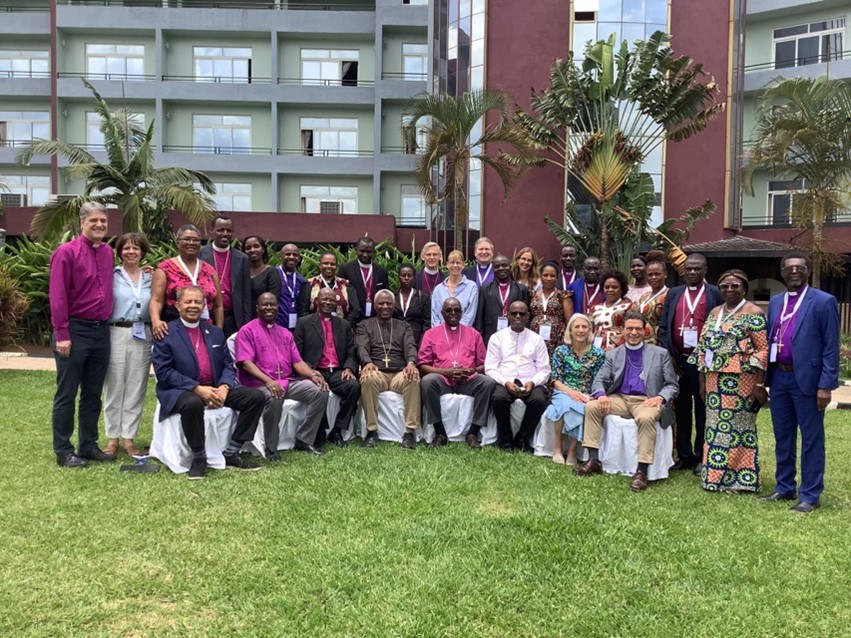February 2024 editorial:
Gafcon Kigali ‘Priority’ 6:
We will resource and support bishops’ training that produces faithful, courageous, servant leaders.
Here is a trustworthy saying: whoever aspires to be an overseer desires a noble task. 1 Timothy 3:1
What is a bishop? Why do we have them?
During the time of the apostles, the Greek word ‘episkopos’ (meaning ‘overseer’, from which we get the English word ‘bishop’) appears to be used interchangeably with ‘presbyteros’ to describe a church leader, elder, minister or pastor in a congregation.
Initially, the expanding network of local churches were led by presbyters/bishops, who were appointed and were overseen by apostles, the first church-planters and guardians of the gospel message which they had received directly from the Lord Jesus.
But as the church spread, there was a need for another level of responsibility, oversight and care of the pastors, maintaining of unity around correct doctrine, and administration. So Paul says to Titus that he should “appoint elders [presbyteroi] in every city” (Titus 1:5), the implication being that he, Titus, was in charge of a number of churches over a wide geographical area. In writings of early church leaders which date from after the death of the first apostles, we see that these ‘overseers’ of groups of churches began to be called “bishops”, as a distinct office from the elders or pastors of local congregations. Anglican, Orthodox and Roman Catholic churches have always used a system of pastoral care and governance derived from this.

Some Protestant denominations, following early Anabaptist and Puritan traditions of the Reformation, have reacted against the dangers and temptations of worldly power associated with this system, developed the ‘independent congregation’ models. There are of course advantages and disadvantages with different systems of church governance. As Anglicans we are episcopalians. Our congregations are not independent, self-governing, each one linked only informally and voluntarily with others of like mind. Anglican clergy and churches are part of a formal network, legally and spiritually accountable to an authority structure, which in turn is part of a wider system.

While having a system of bishops is not commanded by Scripture, it was clearly seen very early on as not contradicting God’s word and useful for the church. Ideally this has as its purpose the spread of the gospel and making disciples of Jesus through local congregations led by presbyters, under the wider pastoral oversight of a godly man who himself is accountable to higher structures of authority. Gafcon has restored the concept of this authority being subject to God’s word rather than human tradition or secular power, and that the senior archbishops link a global network, rather than authority residing in one country.
What should a bishop be like, and what should he do?
The passage about ‘bishops’ or overseers in 1 Timothy 3 continues with a list of necessary qualities that are almost all about godly character. The only special gift needed is the ability to teach. Paul seems to take for granted that church organisation, worship etc would largely follow patterns inherited from Jewish synagogues. So also today, while some patterns of Anglican church administration are similar around the world, there is flexibility and scope for local arrangements that suit the different cultures. These things are of secondary importance compared to agreement on the key doctrines of the Christian faith according to Scripture, and leaders who are faithful and “above reproach” (1 Tim 3:2).
What is the jurisdiction of a bishop?
In the early church, although serious disputes and false teaching existed, there were not different denominations as we have today. A bishop was assumed to have pastoral responsibility for all the churches in his area, and in fact a call to bring to Christ everyone in that area whether Christian or not. Since that time there have been major schisms, and especially since the Reformation, a proliferation of different Protestant denominations, many of which are governed by bishops. There are even a number of different Anglican churches, all of which are led by bishops who have been consecrated by other bishops and which, at least nominally, adhere to the teachings of the catholic and apostolic church. Because of this, we have Anglican jurisdictions and episcopal ministries which are overlapping in the same geographical area.
Some bishops may be godly and believe orthodox doctrine, but simply out of their depth at handling the responsibilities. This is not a reason to separate from the church and either seek another bishop or form an independent church. This bishop can be given help in the areas where he is struggling, so he can focus on teaching and pastoral care. What if a bishop is a bad character? There have been some notorious bad bishops in the church’s history – overtly and unrepentantly sinful; sexually immoral, financially corrupt or cruel and domineering – who perhaps attained their position through nepotism or connections with secular powers. These individuals do not necessarily invalidate the ministry of the church generally.

When should separation be considered?
Theologian Martin Davie says that sadly there are times “when a church and/or bishop in a particular place departs from Christian orthodoxy in matters of belief or conduct to such a serious extent that faithful Christians have no alternative but to separate themselves from that church or bishop…the well-being of the church and the effectiveness of its mission requires breaking the rules…” [Bishops Past, Present and Future, p560].
It is dangerous for the church as a whole when individual bishops contradict the bible’s message and even seek to change the teaching of the whole church to align with their views. It is even more serious when the majority of the bishops in a Province have turned away from the truth to heresy, and have been dishonest and high-handed in doing so. In such a case it is not sufficient to request ‘alternative oversight’ from another bishop in the same jurisdiction, because such oversight would still be subject to the jurisdiction of an overall episcopal culture which can no longer be trusted to proclaim the truth and refute error.
Among faithful Anglicans concerned about the departure from orthodoxy by bishops, there are different interpretations of what is happening and what to do. For some, the situation is hopefully temporary and can be turned around, or if not, it can be tolerated at local level. Those aligned with Gafcon take a more pessimistic view. A new structure needs to be created, under faithful bishops, to ensure the continued proclamation of the authentic gospel from biblically faithful Anglican churches. For some, this means “temporary informal non-episcopal oversight”, and then the negotiation of a new orthodox Province alongside Canterbury and York. For others, it means departure from the Canterbury-aligned structures, and joining a Gafcon-recognised Anglican jurisdiction such as Anglican Network in Europe or Free Church of England.
How can we ensure Anglican bishops around the world remain faithful?
The Gafcon movement realised early on that faithful bishops are essential to the task of keeping the teachings and worldview of Scripture at the heart of authentic Anglicanism. The Bishops’ Training Institute was set up as a series of residential conferences where new bishops and their wives from around the world can worship and pray together, get to know each other, and be encouraged and strengthened by hearing the re-statement of the “good deposit” that they are tasked with guarding and proclaiming. They have opportunities to discuss pastoral and administrative issues and if necessary identify further study and training in these areas. And they learn about the recent history of the crisis in global Anglicanism and the need for Gafcon in the face of the dominance of false, secular-influenced worldviews in the financially powerful churches of the West.
The photo below shows the BTI group, with Archbishops Orombi and Mbanda front and centre.

The most recent and 7th BTI was held in Kigali in mid February. Bishops from Canada, Ethiopia, Ghana, New Zealand, Madagascar, Rwanda, Tanzania, and USA attended the five day event, facilitated by trainers led by Archbishop Henry Luke Orombi, former Primate of Uganda. Jay Behan of the Church of Confessing Anglican Aotearoa New Zealand said: “The training we received from experienced bishops combined with fellowship with other recently ordained bishops from around the world has been challenging, encouraging and enriching. I am so thankful to Gafcon for all they have done to make this happen.”
Please pray for the ongoing work of equipping faithful, wise and godly overseers for the church around the world.
Pray for the Gafcon Primates Council meeting in Kigali, 7-10 March.